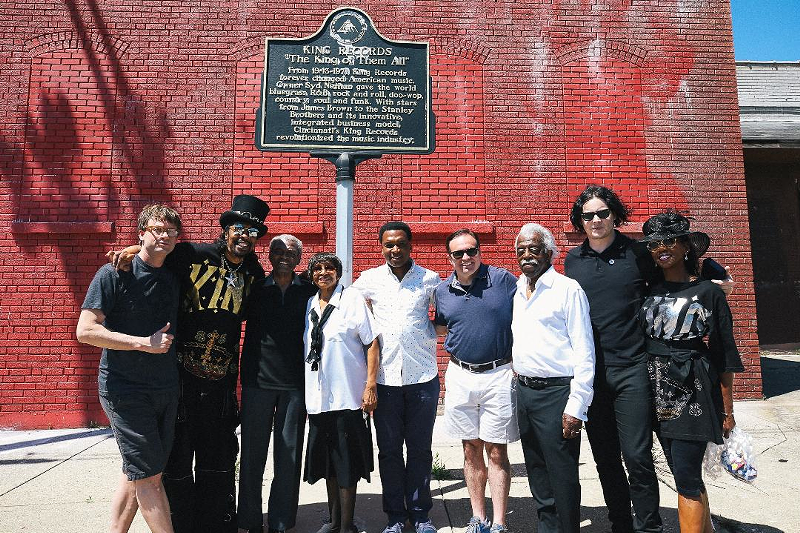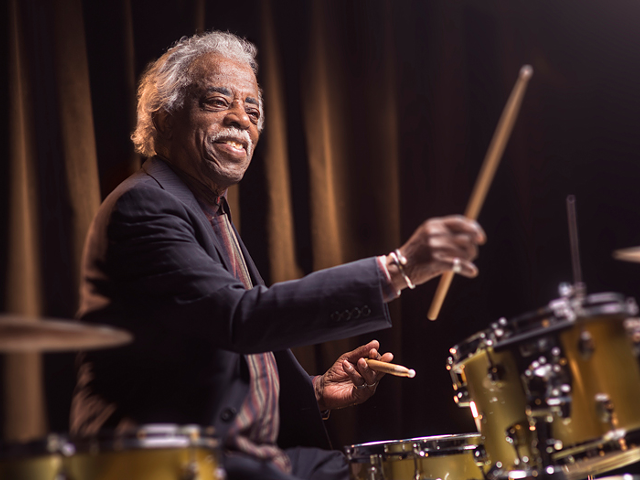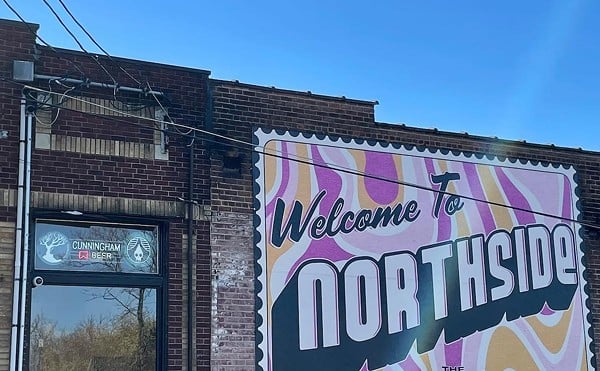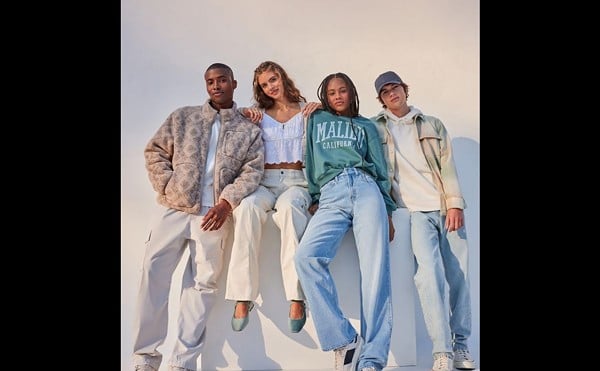
Photo: Third Man/David Swanson
Philip Paul (third from right) with musicians, politicians and supporters of the King Records revitalization project. From left: Elliott Ruther/CMHF King Steering Group, Bootsy Collins, Otis Williams, Anzora Adkins, Kent Butts, former mayor John Cranley, Jack White and Patti Collins.
Cincinnati suffered a big loss on Sunday, Jan. 30, when local musician Philip Paul passed away at age 96.
Paul is a legend, having played on over 350 recordings for Cincinnati's King Records during his time as session drummer from the early 1950s through the mid '60s and beyond. He played on and created the beat for "The Twist" by Hank Ballard (further popularized after Dick Clark's friend Chubby Checker performed it on American Bandstand), and on the first recording of "Train Kept A-Rollin'" during his time as drummer for the Tiny Bradshaw Orchestra. That song was recorded later by Rockabilly legend Johnny Burnette in 1957, as well as by The Yardbirds as a 1960s Garage Rock staple and by Led Zeppelin as an almost precursor to Metal. It was covered again in the 1970s by Aerosmith, and still done today on a regular basis by bands in the know.
Paul played on "Fever" by Little Willie John, "Hideaway" by Freddie King (a huge influence on '60s electric guitar players like Eric Clapton and Peter Frampton) and "Please Come Home For Christmas" by Charles Brown (now a Christmas standard). He also performed with Grand Ole Opry star Cowboy Copas and toured the country in the finest Jazz clubs of the era. Jazz legend Duke Ellington even once asked him to join his band.
Paul witnessed and was a part of the birth of Rock & Roll and has been honored by the Rock and Roll Hall of Fame. He helped educate and preserve Cincinnati's music history after becoming one of the spokespeople for King Records’ legacy, deservedly becoming a local celebrity, and still played publicly on a regular basis in his later years.
His role is important in the history of American music. Phil’s story is a great one and not just because he played Jazz in Harlem at the Savoy Ballroom and in Cincinnati's Cotton Club, or because he toured the country, playing with Jazz legends — that would be enough — but he also played and recorded with Country, Blues and R&B legends, leaving his own mark. He is a link to all the original ingredients of modern popular music.
Here, writer Brent Stroud has collected tributes from local musicians and friends. (You can also read Stroud's 2011 interview with Paul at citybeat.com.)
“I’ve known Philip Paul for 25 years. He was a rumor first, this obscure local drummer who’d played on hundreds of game-changing King recording sessions. As music critic for the Enquirer, I knew that, if true, he would be a great story. He became an even greater friend. I interviewed him dozens of times, for the Enquirer, for Living Blues Magazine, Cincinnati Magazine and other publications, assorted radio stations, the Grammy Foundation’s Living History Archives and public events at the Country Music Hall of Fame and The Center For Popular Music.
My stint at the Memphis Commercial Appeal had taught me what a great music heritage could do for a city, and I believed King could do that for Cincinnati. Phil and his first wife Juanita, a former Cotton Club dancer, were the perfect King ambassadors — the always elegant Juanita, whose fashion sense was as sharp as her sense of humor, and Phil, dignified, handsome, charismatic, sweet as pie and tough as nails. My favorite tough-as-nails Phil story took place at a King Country session. The singer asked him, 'What’re you gonna play on my record, boy?' And Phil responded, looking him straight in the eye, 'I don’t know. What do you want me to play, boy?'
He never became bitter. He came to play and he did, developing his own style utilizing brushes, the sound that powered the first hit record he played on, Tiny Bradshaw’s 'Soft.'
On Country and Bluegrass records he often played with a stick and a brush, creating a drum lick emulating country guitar’s bass-note/strum. Phil generously credited me with starting the long-overdue recognition he enjoyed in the 21st century, and there is no part of my career in music, writing and production that I’m prouder of than working with Phil.
In the last year of his life I was able to help facilitate his highest-profile recording project, Smithsonian-Folkways’ Industrial Strength Bluegrass, producer Joe Mullins’ award-winning, star-studded tribute to Southwestern Ohio Bluegrass and the King legacy.
Thanks to Phil, I also had a late-career milestone, writing my first beer can for Listermann’s 'Fas Foot Phil,' part of their King Records tribute series.
I last saw him in late October, a visit I knew would be our goodbye. He’d played until his body gave out, doing four sets a night well into his 90s. When Juanita, his wife of 60 years, passed, I thought that would kill him. Instead, Phil was reborn, finding love at 90, reuniting with his old flame Bobbie, who was with him to the end.
Today, I’m almost as old as Phil was when we met. I learned a lot from him in the years between, about music and about life. The most important lesson was the simplest: Never stop. Never stop living. Never stop loving. Never stop playing. May we all have the kind of life that Philip Paul had.”
— Larry Nager, former Enquirer music critic, writer, musician, filmmaker, friend
“Phil. A legend. So humble and talented. So many memories that he willingly shared with his fans. A mentor to many drummers and musicians. A friend. An inspiration to all of us. What a great loss for Cincinnati's music scene.”
— Lee Hay, longtime Cincinnati Public Radio radio producer/host
“I first got to know Philip Paul back in 2007 when I would see him play in a combo at the Cricket Lounge. I would chat with him during his breaks and he would talk about his career as a studio drummer. Every time I met him over the years, he was always a sharp-dressed man, his clothes as meticulous as his playing.
I believe Philip's preference would be that he be remembered as a Jazz musician, but as he told me it was his skills as a Jazz player that allowed him to performance all the different kinds of music that King Records called on him to play.
I did many programs with Philip over the years at the Main Library. My favorite was the one that he discussed his recording sessions with the great Blues guitarist Freddie King in the early 1960s. In my opinion, that rhythm section (Philip and bassist Bill Willis) had an amazing chemistry with Freddie and those recordings are as important to Rock history as James Brown's from his King Records period.
What many people may not know is that same rhythm section, of two African American musicians, play on a No. 1 Country Music hit in 1963, "Lonesome 7-7203," backing Hawkshaw Hawkins in the same studio in Cincinnati, down the street from Philip's house.”
— Brian Powers, librarian, historian and author
“RIP Phil. Thanks for all the compliments on my playing. It meant a whole lot coming from you. P.S. we recorded 'Train Kept A-Rollin’' yesterday and I thought of you a lot while doing it.”
— Johnny Walker, musician in the All-Seeing Eyes and Soledad Brothers, via Facebook
“I’ll always remember the first time I met him, circa 1970, with my dad after his gig. We stopped at Sugar & Spice for a post-gig breakfast. On our way out, my dad saw Philip sitting at the counter and stopped to chat…this guy...Philip Paul…was unbelievable looking to me…wearin’ a tux…perfect hair…giant smile…my dad introduced him to me saying I was gonna be a player…he shook my hand…he was a giant to me in that instant All I can say about him is this: he played on freaking 'Hideaway.' I’ve thought about PP before in this way: Eric Clapton, Jeff Beck, Jimmy Page, Albert Collins, Stevie Ray Vaughan, Jimmie Vaughan, John Mayall and scads more: All of them listened to Freddie King records recorded at King…thus all of them were familiar with Philip Paul. That blows my little Kenwood, OH mind.”
— Todd Remmy, local musician, via Facebook
“I was lucky enough to have photographed and listened to Philip in Cincinnati over the last 20 years. He was easily the most kind, generous and gracious man I had the pleasure of knowing. On top of all that, he was the heartbeat of rock n roll. Rest in power Mr Philip Paul.”
— Scott Beseler, photographer, owner of the Lodge KY studio, via Facebook
Stay connected with CityBeat. Subscribe to our newsletters, and follow us on Facebook, Instagram, Twitter, Google News, Apple News and Reddit.
Send CityBeat a news or story tip or submit a calendar event.





